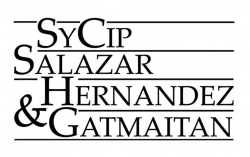The Philippines has been actively strengthening its measures to combat financial crimes and protect its financial system through enhanced Anti-Money Laundering (AML) enforcement. Backed by the Anti-Money Laundering Act, authorities are well-equipped to probe and prosecute individuals and entities involved in money laundering. Bodies like the Anti-Money Laundering Council (AMLC) play a crucial role in ensuring AML compliance, conducting thorough investigations, and levying penalties for violations. By focusing on increased transparency, refined reporting systems, and fostering partnerships with global entities, the Philippines is making strides in its battle against money laundering while upholding financial sector integrity. In this Q&A, we engage in a conversation with Ma. Patricia B. Paz-Jacoba, a partner at the Philippines-based law firm SyCipLaw, to delve deeper into this subject.
Conventus Law: In the National Anti-Money Laundering, Counter-Terrorist Financing (CTF), and Counter Proliferation Financing Strategy (NACS) for 2023-2027, Philippine President Ferdinand R. Marcos, Jr. strives to enhance the nation’s AML/CTF framework. Could you provide further details on this?
SyCipLaw: The adoption of the National Anti-Money Laundering (“AML”), Counter-Terrorist Financing (“CTF”), and Counter Proliferation Financing (“CPF”) Strategy 2023-2027 (“NACS 2023-2027”) is a comprehensive strategy aimed at strengthening the Philippines’ AML/CTF/CPF regime and was brought about by multiple factors.
First, in 2019, the Financial Action Task Force (“FATF”), an intergovernmental body that serves as the “global money laundering and terrorist financing watchdog,” affirmed the Third Mutual Evaluation Report (“MER”), which placed the Philippines under a twelve-month observation period, pursuant to the FATF International Co-operation Review Group (“ICRG”) process.
Second, in 2021, the Philippines was included in the FATF “Grey List” or the list of “Jurisdictions Under Increased Monitoring” because of its failure to show tangible and positive progress in addressing all key recommended actions in the Third MER.
Third, with the expiration of the NACS 2018-2022, it was necessary to adopt an updated strategy to strengthen and improve the country’s AML/CTF/CPF regime. As such, the President adopted the NACS 2023-2027 for the purpose of enabling the Philippines to address the ICRG Action Plans, to ensure that the Philippines exits the FATF Grey List, and to improve the country’s AML/CTF/CPF regime. The NACS 2023-2027 aims for a “one nation approach,” recognizing the need for a coordinated and collaborative strategy in addressing risks, correcting deficiencies, and strengthening the country’s AML/CTF system.
According to the Anti-Money Laundering Council (“AMLC”), the NACS 2023-2027 “addresses strategic deficiencies identified in international assessments, ensuring compliance with global standards.” Specifically, the NACS 2023-2027 identifies seven “Strategic Objectives,” each with a corresponding action plan, aimed at addressing the risks and deficiencies of the Philippines’ AML/CTF systems. The following are the Strategic Objectives:
- Demonstrate that the Philippines has addressed strategic deficiencies identified in international AML/CTF assessments and that the measures contribute to effective and sustainable outcomes;
- Strengthen law enforcement and prosecutorial capacity for the effective development of financial intelligence, investigation, prosecution, and confiscations in relation to money laundering and its predicate offenses;
- Strengthen mechanisms to identify, investigate, and prosecute terrorism financing, including through the implementation of measures to prevent and disrupt terrorism financing;
- Enhance and implement the framework against proliferation financing of weapons of mass destruction;
- Promote transparency and ensure access to beneficial ownership information by competent authorities;
- Enhance risk-based supervision of financial institutions and designated non-financial businesses and professions to promote understanding of risks and understanding of obligations among supervised sectors; and
- Promote AML/CTF awareness of government agencies, covered persons, and the general public to effectively combat money laundering, terrorism financing, and proliferation financing.
In this regard, the Office of the President issued Memorandum Circular No. 37, series of 2023, directing all concerned departments, agencies, bureaus, and instrumentalities of the National Government, including government-owned or controlled corporations and local government units, to timely formulate and implement plans and programs to implement the NACS 2023-2027 and the Strategic Objectives.

“(…) There is also now a separation between the proliferation financing subcommittee from the former counter-terrorism financing and proliferation financing subcommittee. Such a delineation, according to the AMLC, “acknowledges the unique challenges posed by proliferation financing” and “demonstrates a nuanced approach to tackling financial crimes comprehensively.”
Ma. Patricia B. Paz-Jacoba – Partner, SyCipLaw
Conventus Law: President Marcos states that NACS 2023-2027 is set to accomplish this objective in collaboration with the revamped National AML/CTF Coordinating Committee. With its extended responsibilities, the Committee now goes by the name National Anti-Money Laundering/Counter-Terrorism Financing/Counter Proliferation Financing Coordinating Committee (NACC). What impact will this transformation have in practice?
SyCipLaw: According to the AMLC, the restructuring of the National AML/CTF Coordinating Committee to the National Anti-Money Laundering/Counter-Terrorism Financing/Counter Proliferation Financing Coordinating Committee (“NACC”) demonstrates a pivotal shift, as there is now a more heightened focus on combating proliferation financing. There is also now a separation between the proliferation financing subcommittee from the former counter-terrorism financing and proliferation financing subcommittee. Such a delineation, according to the AMLC, “acknowledges the unique challenges posed by proliferation financing” and “demonstrates a nuanced approach to tackling financial crimes comprehensively.”
Conventus Law: Despite making advancements in key areas, the country stayed on the Financial Action Task Force (FATF) “grey list” after the June 2023 meeting. What further measures are forthcoming?
SyCipLaw: According to the AMLC, on January 2, 2024, the President called a meeting among all concerned agencies and directed them to “expedite efforts in addressing [the] deliverables set by FATF within the year.” The NACC also holds regular meetings to monitor each agency’s progress in connection with their specific targets. Additionally, there are ongoing discussions on additional strategies to accomplish the action plans more efficiently and effectively. The AMLC explains that the “Philippines will continue to focus on demonstrating significant improvement in its Anti-Money Laundering and Counter Terrorism Financing regime, including increasing risk-based supervision of Designated Non-Financial Businesses and Professions (“DNFBPs”), mitigating risks associated with casino junkets, enhancing and streamlining law enforcement agencies’ access to Beneficial Ownership information, and increasing Money Laundering and Terrorism Financing Prosecutions.”
“According to the AMLC, it may take some time for new regulations to be issued and enforced and so covered persons are advised to proactively check the recommendations and latest developments from the FATF. Doing so will allow covered persons to anticipate the requirements that may be required by forthcoming regulations. “
Ma. Patricia B. Paz-Jacoba – Partner, SyCipLaw
Conventus Law: How can the country transition out of the “grey list”?
SyCipLaw: The FATC ICRG provided eighteen action plan items that the Philippines must implement within given timeframes to exit the grey list. All the ICRG action plans must be assessed to have been “largely addressed” for the Philippines to exit the grey list. The ICRG action plan items broadly cover the following areas:
- supervision of covered persons;
- access to beneficial ownership information;
- enhancements in money laundering and terrorism financing investigations, prosecutions, and confiscations;
- enforcement of cross-border declarations;
- use of targeted financial sanctions in terrorism and proliferation financing; and
- risk-based measures to protect non-profit organizations.
Specifically, according to the AMLC, the following must be implemented immediately to increase the possibility of the Philippines exiting the FATF Grey List:
- Risk-based supervision of DNFBPs
The AMLC, Philippine Amusement and Gaming Corporation (“PAGCOR”), and Cagayan Economic Zone Authority must continue to conduct risk-based supervision and compliance testing of DNFBPs, as well as the implementation of “dissuasive and proportionate enforcement actions” against non-compliant DNFBPs. In addition, PAGCOR should continue to implement risk-based supervision of the restructured and consolidated Internet Gaming Licensees sector [formerly the Philippine Offshore Gaming Operators sector], to ensure that the new regulatory framework prevents criminal ownership or control.
- Mitigating risks associated with casino junkets
PAGCOR should strengthen the implementation of AML/CTF controls of the junket sector. It is important for casinos to conduct customer due diligence on junket operators and the individual junket players, and submit Suspicious Transaction Reports, if warranted. Non-compliance by casinos will result in appropriate sanctions.
- Beneficial Ownership information
Corporations under the supervision of the Securities and Exchange Commission (“SEC”) should continue to submit accurate and updated beneficial ownership information, in compliance with the SEC’s regulations. Further, law enforcement agencies may request beneficial ownership information from the SEC to support their financial investigations.
- Money Laundering Investigations and Prosecutions
The relevant law enforcement agencies must sustain the increased filing of money laundering cases with the Department of Justice (“DOJ”) and the courts. According to the AMLC, the complaints “should be related to a variety of high-risk predicate crimes such as corruption, smuggling, environmental crimes, intellectual property violation, etc.”
- Terrorism Financing Prosecutions
The relevant law enforcement agencies must continue to prioritize terrorism financing prosecutions and demonstrate that terrorism financing cases filed with the DOJ and the courts result in successful prosecutions.
- Cross border measures
In all operating international airports, the currency declaration and baggage declaration forms have already been integrated into the eTravel system. In this connection, the Bureau of Customs (“BOC”) must continue to enhance implementation of cross border declaration measures in all international seaports as well. The BOC should likewise focus on increasing the detection of false declarations and confiscations.
Conventus Law: Regulations concerning AML/CTF are undergoing reorganisation and expansion, necessitating regulated firms to remain abreast of the most recent advancements. What changes in regulations do you anticipate in the near future?
SyCipLaw: The AMLC has initiated the process of amending the 2018 Implementing Rules and Regulation (“IRR”) of Republic Act No. 9160, otherwise known as the Anti-Money Laundering Act of 2001, as amended, and the 2012 IRR of RA No. 10168, otherwise known as the Terrorism Financing Prevention and Suppression Act of 2012 in preparation for the 2026 Mutual Evaluation. The amendments include addressing the FATF technical requirements and clarifying some policy and operational matters. The amendments are also intended to address the technical and operational gaps in the AML/CTF framework identified in the 2019 MER.
The AMLC is also undertaking a review and revision of the 2021 AMLC Registration and Reporting Guidelines, to address recommendations from the MER. This revised version is expected to be implemented within the year.
Finally, developments and advancements in the AML/CTF framework in its entirety are generally expected, in preparation for the FATF’s Mutual Evaluation of the Philippines in 2026.
Conventus Law: New regulations are expected to be introduced in sectors previously lacking oversight. To enhance operational risk management, what steps should organisations take to update their enterprise-wide risk assessments effectively?
SyCipLaw: According to the AMLC, it may take some time for new regulations to be issued and enforced and so covered persons are advised to proactively check the recommendations and latest developments from the FATF. Doing so will allow covered persons to anticipate the requirements that may be required by forthcoming regulations. Further, the AMLC recommends that organizations adopt a “combined reactive and proactive approach in the conduct and/or updating of their Institutional Risk Assessments (IRAs).”
Specifically, organizations may consider incorporating the results of the upcoming National Risk Assessment (“NRA”), a self-assessment by Philippine authorities using the Risk Assessment Tool, which was developed and provided by the World Bank, as a foundation for their risk assessment framework. According to the AMLC, “by integrating insights from the results of the upcoming NRA into their risk assessment framework, organizations will be able to align it more closely with the identified national-level threats and vulnerabilities to address operational risks which may be brought by the changes in the AML/CTF landscape.”
Additionally, since AMLC regularly conducts on-site and off-site examinations and reviews of covered persons, including the identification of deficiencies related to risk assessments, organizations should consider and implement AMLC’s recommendations after such examinations. Organizations may also consider adhering to the provisions of the AMLA IRR in crafting their Money Laundering and Terrorist Financing Prevention Program (“MTPP”). Further, as advised by AMLC, organizations may consider conducting a comprehensive review of their existing risk assessment frameworks as well as engage in “thorough due diligence processes, considering factors such as, but not limited to customer profiles and transaction volumes, to accurately assess their exposure to money laundering and terrorism financing risks.”
“(…) it is necessary to streamline processes through automation and to eliminate unnecessary steps to reduce the risks of errors. Thus, the AMLC states that “through proactive identification and prevention of money laundering attempts, adaptation to regulatory changes, streamlining AML processes, and implementing continuous improvement, AMLC can effectively detect and prevent financial crimes.”
Ma. Patricia B. Paz-Jacoba – Partner, SyCipLaw
Conventus Law: Anticipating regulatory and financial crime shifts demands a proactive stance on risk management. How do you perceive this standpoint?
SyCipLaw: It is true that a proactive approach to risk management is needed to stay ahead of regulatory and financial crime changes. According to the AMLC, such “proactive approach involves leveraging data, information, and findings from investigations and reports to detect suspicious activity patterns.”
AMLC explains that the “key to effective AML compliance lies in proactive identification and mitigation of potential risks and issues before they escalate.” Also, “scenario planning” will help agencies anticipate new criminal methods, which would allow “preemptive adjustments to controls.” On the part of AMLC, a proactive approach means implementing constant updates to AML frameworks. This would allow for “adjustments to internal controls, risk management, and [customer due diligence] procedures, ensuring consistent compliance with evolving regulations.” Additionally, it is necessary to streamline processes through automation and to eliminate unnecessary steps to reduce the risks of errors. Thus, the AMLC states that “through proactive identification and prevention of money laundering attempts, adaptation to regulatory changes, streamlining AML processes, and implementing continuous improvement, AMLC can effectively detect and prevent financial crimes.”
As for organizations, a proactive approach may mean continuous monitoring of regulatory developments, conducting regular and consistent risk assessments in collaboration with relevant government agencies, implementing robust compliance procedures, and fostering a culture of compliance. By anticipating and addressing potential risks, organizations may mitigate the possibility of regulatory violations and financial crimes and maintain trust with stakeholders.

- Financial Action Task Force (herein now cited as “FATF”), Who we are (https://www.fatf-gafi.org/en/the-fatf/who-we-are.html, last accessed 30 April 2024)
- E.O. No. 33, Whereas clause.
- E.O. No. 33, Whereas clause; FATF, Philippines (https://www.fatf-gafi.org/en/countries/detail/Philippines.html, last accessed 30 April 2024)
- E.O. No. 33, Whereas clause.
- E.O. No. 33, Section 1.
- National Anti-Money Laundering Counter-Terrorist Financing and Counter Proliferation Financing Strategy 2023-2027 (herein now cited as “NACS 2023-2027”), Introduction.
- NACS 2023-2027, Strategic Objective No. 1.
- Anti Money Laundering Council, The Philippines Second National Risk Assessment On Money Laundering And Terrorist Financing (2017), (you may access a copy through this link: http://www.amlc.gov.ph/images/PDFs/NRAReport20152016.pdf)
WRITTEN BY

Ma. Patricia B. Paz-Jacoba – SyCipLaw,
mpbpaz@syciplaw.com
Ma. Patricia B. Paz-Jacoba is a partner and a member of the firm’s litigation and arbitration, tax, and intellectual property practice groups.
She has deep experience in dispute resolution for clients operating in the highly regulated sectors of consumer products, water, energy, mining, environmental protection, land use and telecommunications, including in domestic and international arbitrations both institutional and ad hoc, and in court procedures in aid of arbitration.
She also has expertise in complex commercial contract disputes, intra-corporate and shareholders’ disputes, white collar crime investigations and prosecutions including for fraud and defamation, family law, healthcare litigation, intellectual property rights enforcement, and tax litigation.
Work Experience
Ms. Paz-Jacoba has represented clients in all levels of the Philippine judiciary including the Court of Tax Appeals (tax court) and the Sandiganbayan (graft court), in matters before international and domestic arbitral tribunals, as well as in proceedings before administrative agencies.
She is a significant contributor in many of the firm’s high-value cases. Her portfolio of cases includes:
- defending the country’s largest power distribution public utility company in anti-trust litigation before the energy sector regulator;
- representing a publicly listed project owner, engaged in power generation, distribution, and retail electricity services, in two related high-value arbitrations under the rules of the Hong Kong International Arbitration Centre;
- advising several foreign clients in a national public inquiry on the human rights implication of climate change;
- defending an international organization’s immunity rights in criminal suits against its high-ranking officials;
- representing a sub-contractor in court proceedings for interim measures of protection, which successfully prevented calls on standby letters of credit, and in the related construction arbitration administered by the Singapore International Arbitration Centre;
- securing a favorable award for a luxury real estate developer after successfully impleading the guarantor in a construction arbitration initiated by the contractor before the Construction Industry Arbitration Commission;
- successfully obtaining a reversal from the appellate courts of a construction arbitral award on the import of the term “exclusive of Value Added Tax” in the contract price provision of the parties’ USD110 million construction agreement;
- representing the subsidiary of a publicly listed Philippine conglomerate in a judicial claim for refund before the Court of Tax Appeals to recover a total of over one billion pesos in excise taxes that were wrongfully collected by the Bureau of Internal Revenue.
She is an accredited arbitrator of the Philippine International Center for Conflict Resolution, and is a recognized ADR Practitioner in Arbitration by the Philippine Department of Justice – Office for Alternative Dispute Resolution.
She is also a member of the Philippine Institute of Arbitrators and the Intellectual Property Association of the Philippines, Inc.
Ms. Paz-Jacoba has been cited as a Next Generation Lawyer and Rising Star by Legal 500 Asia Pacific. She has also been selected for inclusion in The Legal 500’s inaugural Arbitration Powerlist – South East Asia region, and is shortlisted as “Lawyer of the year (Litigation)” in The Legal 500 Southeast Asia 2023 Awards.
Admission to the Bar
2010, Philippines
Education
UP Diliman (B.A., cum laude, 2005; J.D., 2009)
Publications
Ms. Paz-Jacoba is the author or co-author of several publications including the Philippine Chapters for “The Legal 500: International Arbitration Comparative Guide” in 2022 and “CMS Guide on the Recognition and Enforcement of Foreign Judgments and Awards (Southeast Asia Edition)” in 2021; Philippine Chapters for the World Bank’s flagship “Doing Business” publications from 2016 to 2020; “Enforcement of Foreign Judgment Guide” for the Multilaw Litigation Practice Group (LPG) in 2019; “Filing a Complaint in the Philippines” for the World Bank’s “Benchmarking Public Procurement 2016 Project”; “Complaints mechanism concerns” for International Financial Law Review in 2015; and the Philippine Chapter for Juris Publishing, Inc.’s “International Product Liability” in 2011.
Professional Activities
Philippine Institute of Arbitrators
U.P. Women Lawyer’s Circle
Integrated Bar of the Philippines – Quezon City

Ramon I. Rocha IV – SyCipLaw,
rirocha@syciplaw.com
Ramon I. Rocha IV is a member of the firm’s litigation and arbitration department. Mr. Rocha has significant experience in civil and criminal litigation, and in commercial arbitration.
Mr. Rocha represents clients before administrative and quasi-judicial agencies such as the Fair Trade Enforcement Bureau of the Department of Trade and Industry, the Energy Regulatory Commission, the Commission on Audit, and the Philippine Competition Commission.
Mr. Rocha also handles corporate secretarial work and advises clients on general regulatory requirements.
Mr. Rocha has conducted training sessions among clients’ management and staff in respect of potential dawn raids by various administrative agencies. He was also a panelist in a mock virtual arbitration hosted by the Young Members Group of the Chartered Institute of Arbitrators (East Asia Branch).
Admission to the Bar
2016, Philippines
Education
University of the Philippines, Diliman (J.D., B.A.)
Publications
- Co-contributor, Philippine Chapter, Lexology Getting The Deal Through: Enforcement of Foreign Judgments 2022, published by Law Business Research, August 2021
- Co-contributor, Philippine Chapter, Lexology Getting The Deal Through: Enforcement of Foreign Judgments 2021, published by Law Business Research, August 2020
Professional activities
Member, Integrated Bar of the Philippines, Makati Chapter


